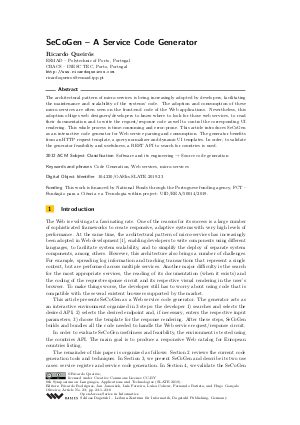SeCoGen - A Service Code Generator
Author Ricardo Queirós
-
Part of:
Volume:
8th Symposium on Languages, Applications and Technologies (SLATE 2019)
Part of: Series: Open Access Series in Informatics (OASIcs)
Part of: Conference: Symposium on Languages, Applications and Technologies (SLATE) - License:
 Creative Commons Attribution 3.0 Unported license
Creative Commons Attribution 3.0 Unported license
- Publication Date: 2019-07-24
File

PDF
OASIcs.SLATE.2019.23.pdf
- Filesize: 391 kB
- 8 pages
Document Identifiers
Subject Classification
ACM Subject Classification
- Software and its engineering → Source code generation
Keywords
- Code Generation
- Web services
- micro-services
Metrics
- Access Statistics
-
Total Accesses (updated on a weekly basis)
0Document
0Metadata
Abstract
The architectural pattern of micro-services is being increasingly adopted by developers, facilitating the maintenance and scalability of the systems' code. The adoption and consumption of these micro-services are often seen on the front-end code of the Web applications. Nevertheless, this adoption obliges web designers/developers to know where to look for those web services, to read their documentation and to write the request/response code as well to control the corresponding UI rendering. This whole process is time-consuming and error-prone. This article introduces SeCoGen as an interactive code generator for Web service parsing and consumption. The generator benefits from an HTTP request template, a query normalizer and dynamic UI templates. In order, to validate the generator feasibility and usefulness, a REST API to search for countries is used.
Cite As Get BibTex
Ricardo Queirós. SeCoGen - A Service Code Generator. In 8th Symposium on Languages, Applications and Technologies (SLATE 2019). Open Access Series in Informatics (OASIcs), Volume 74, pp. 23:1-23:8, Schloss Dagstuhl – Leibniz-Zentrum für Informatik (2019)
https://doi.org/10.4230/OASIcs.SLATE.2019.23
BibTex
@InProceedings{queiros:OASIcs.SLATE.2019.23,
author = {Queir\'{o}s, Ricardo},
title = {{SeCoGen - A Service Code Generator}},
booktitle = {8th Symposium on Languages, Applications and Technologies (SLATE 2019)},
pages = {23:1--23:8},
series = {Open Access Series in Informatics (OASIcs)},
ISBN = {978-3-95977-114-6},
ISSN = {2190-6807},
year = {2019},
volume = {74},
editor = {Rodrigues, Ricardo and Janou\v{s}ek, Jan and Ferreira, Lu{\'\i}s and Coheur, Lu{\'\i}sa and Batista, Fernando and Gon\c{c}alo Oliveira, Hugo},
publisher = {Schloss Dagstuhl -- Leibniz-Zentrum f{\"u}r Informatik},
address = {Dagstuhl, Germany},
URL = {https://drops.dagstuhl.de/entities/document/10.4230/OASIcs.SLATE.2019.23},
URN = {urn:nbn:de:0030-drops-108905},
doi = {10.4230/OASIcs.SLATE.2019.23},
annote = {Keywords: Code Generation, Web services, micro-services}
}
Author Details
Funding
This work is financed by National Funds through the Portuguese funding agency, FCT - Fundação para a Ciência e a Tecnologia within project: UID/EEA/50014/2019.
References
- P. D. Francesco. Architecting Microservices. In 2017 IEEE International Conference on Software Architecture Workshops (ICSAW), pages 224-229, April 2017. URL: https://doi.org/10.1109/ICSAW.2017.65.
- Robert Miller and Max Goldman. Software Construction. https://ocw.mit.edu/ans7870/6/6.005/s16/classes/18-parser-generators/#reading_18_parser_generators , 2016. Spring 2016. Massachusetts Institute of Technology: MIT OpenCourseWare.
- Ricardo Queirós. PROud - A Gamification Framework Based on Programming Exercises Usage Data. Information, 10(2), 2019. URL: https://doi.org/10.3390/info10020054.
- Gabriele Tomassetti. A Guide to Code Generation. https://tomassetti.me/code-generation/, 2018. Accessed: 2018-11-01.
-
Seung-Su Yang, Hyung-Joon Kim, Nam-Uk Lee, and Seok-Cheon Park. Design of Automatic Source Code Generation Based on User Pattern Definition. In James J. Park, Vincenzo Loia, Gangman Yi, and Yunsick Sung, editors, Advances in Computer Science and Ubiquitous Computing, pages 1434-1439, Singapore, 2018. Springer Singapore.

